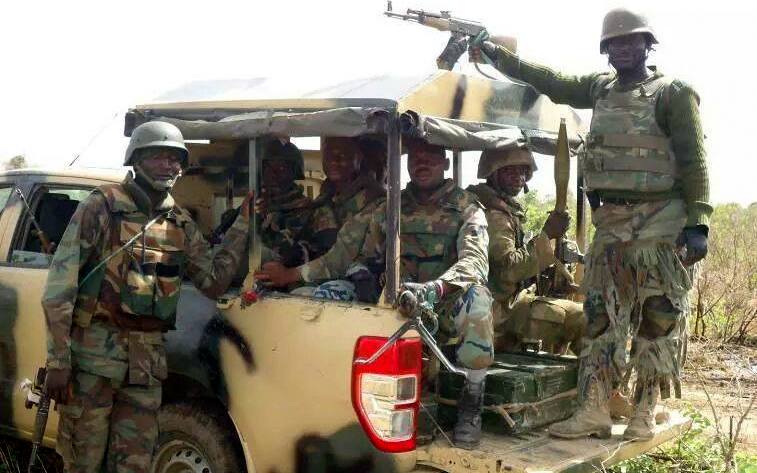BY ADAMU GWAZUWANG
Anyone would have thought the days of cat and mouse ambush games between the military and the politicians are over, after fifteen years of uninterrupted democratic government, but recent rumpus about neutrality of the military in election process, leading to political brickbats and growing distrust between the two camps, suggests otherwise. It must be somewhat embarrassing especially to the military top brass that the high profile of two of its most prominent retired army generals has worked against the military’s interests on an issue that should have been entirely of civilian concern. The way things stand today however, it is the entire transition process hinged on the March 28 elections that it at risk and this should be of concern to all Nigerians.
Dispassionate analysis will locate the epicentre of the crisis in the campaign style of the opposition APC which has retired General Muhammadu Buhari as its presidential candidate. Whereas, the opposition should be focussing on the ruling party PDP and its incumbent President Goodluck Jonathan who is pursuing a second term in its campaigns, it has in fact dragged virtually every agency of the federal government into the fray, with the peculiar exception of INEC, the election umpire. This campaign offensive stems from apparent desperation in opposition quarters to literally confiscate the Presidency from a position of weakness in comparison to the incumbent government that has so much to show for its first four years. Such desperation has already forced the opposition into an all-comers conglomeration of strange-bedfellows with irreconcilable antecedents, united solely by a hunger for power after at least a decade of being outside government. The adoption of broom-wielding “change” as the template of their campaign also meant sweeping all caution to the wind.
It took root in the politicization of the on-going war against Boko Haram as the opposition awkwardly capitalized on the daring onslaughts of the terrorists to amplify their campaigns against the Goodluck Jonathan Presidency, which they persistently projected as incapable of prosecuting an all-out battle. In the process, they rubbished the armed forces’ best efforts, accusing the military command of corruption and the soldiers of cowardice. The role of Generals Obasanjo and Buhari in support of such unpatriotic attitude to a national army at war, solely propelled by a shared political agenda of discrediting the Goodluck Jonathan Presidency and winning the 2015 general elections, was akin to mutiny or other acts of sabotage against the military. The military was also clumsily co-opted into the credentials-crisis that engulfed General Buhari’s presidential bid, especially when it denied custody of the General’s school leaving certificate.
But things came to a head over the controversial rescheduling of the February 14 elections, when a glaringly unprepared INEC passed the buck for the shift in election date instead to the military command’s candid submission to the Council of State, pointing out that with the renewed combat operations against the insurgents, it could not afford to deploy soldiers to back the police in election security arrangements. Since then the opposition’s assault on the professional integrity of the military and the neutrality of its role in defence of the nation has been fuelled by accusations of aligning with the incumbent President to manipulate the election calendar in favour of the PDP. The opposition has gone further to reject any supportive role for the military in the security arrangements for the elections, a dicey departure from a long tradition of such back-up role that was recently exhibited with acclaimed pacifying effects on the conduct of the Ekiti and Osun governorship elections. The opposition even went as far as obtaining a court order barring military deployments during elections.
The average Nigerian today is accustomed to routine deployment of soldiers to quell all manner of civil disturbances and outbreaks of violence and blood-letting, usually as a last resort when the capacity of the police has been overwhelmed. Such deployments became so frequent that the military command at a point drew attention to the situation as a formidable challenge to the operational duties of the army. But, of course, the deployments have always proved very effective in the timely restoration of law and order and subsequent normalcy for people to get on with their lives. Looking back at the recent history of election violence in Nigeria provides further evidence of the crucial impact of military intervention in halting the mind-boggling scale of blood-letting that accompanies release of election results. General Buhari in particular has been associated with the post-election violence in the northern states especially in 2011, the fearful recollection of which sent hundreds of non-indigenes migrating home as the February 14 elections approached.
The opposition APC has definitely taken its desperate bid for the nation’s Presidency beyond reasonable limits of electioneering since its leaders can callously clamour against what is clearly in the best interest of protecting the lives and property of Nigerians as well as facilitating peaceful elections as essential for being free and fair. Besides, the opposition hawks are so careless about what becomes of the nation’s armed forces after they have deliberately discredited them in their desperation to occupy Aso Villa, that majority of right-thinking Nigerians now favour continuity of the Goodluck Jonathan Presidency. That is now the only option left to preserve the last nationalistic and patriotic institution standing in defence of the territorial integrity and peaceful co-existence of the fatherland. What a pity that the two oldest retired army generals are in the forefront of running down the institution that they used to rule Nigeria decades ago, because now they think they can return to power without tanks and rifles !
ADAMU GWAZUWANG WRITES FROM ABUJA



